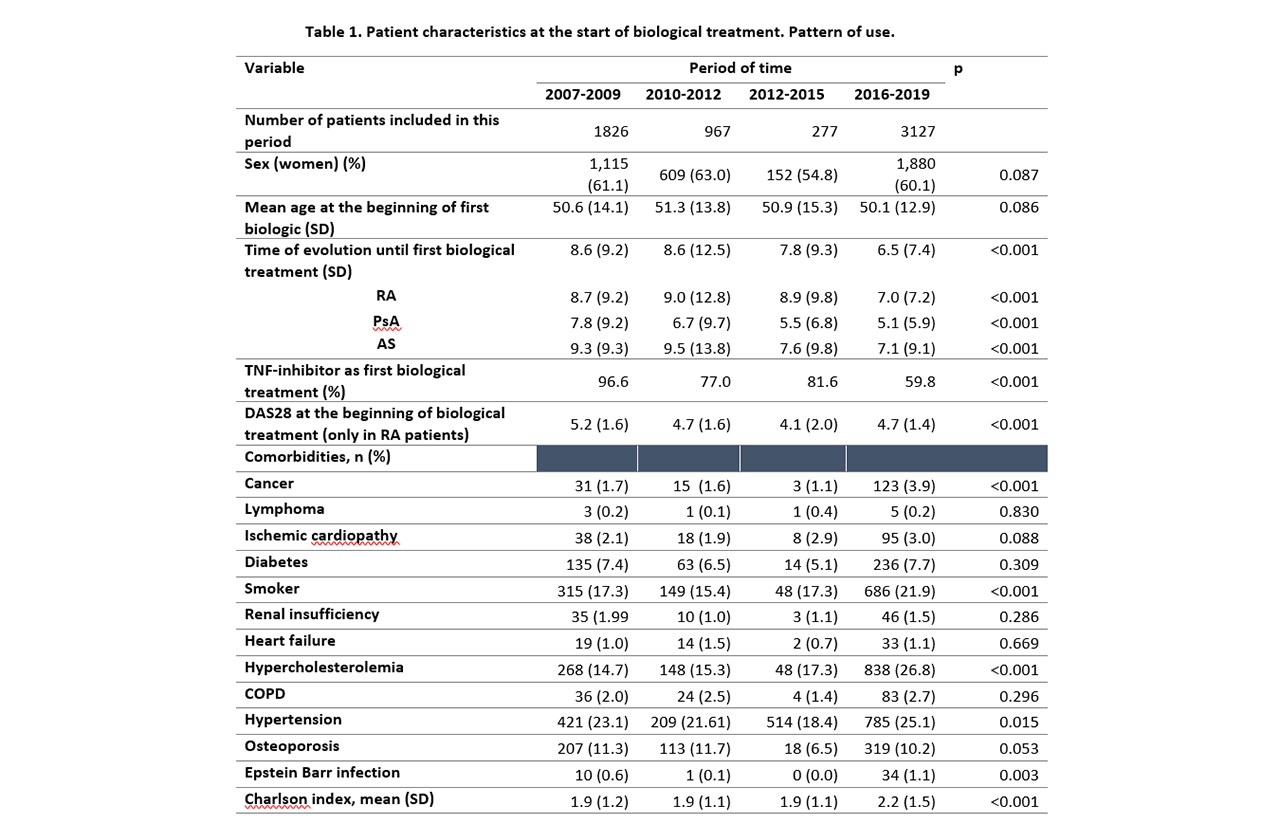Session Information
Session Type: Poster Session (Tuesday)
Session Time: 9:00AM-11:00AM
Background/Purpose: During the past 15 years, advancements in the understanding of the safety and effectiveness, as well as the expanding access and availability of biologic disease-modifying anti-rheumatic drugs (bDMARDs), have likely influenced the pattern of use of such compounds in patients with rheumatoid arthritis (RA), psoriatic arthritis (PsA) and ankylosing spondylitis (AS). This analysis is aimed at assesing changes in the baseline characteristics of RA, PsA and AS patients who underwent biological therapy from 2007 to 2019 in a real world setting.
Methods: Data were obtained from BIOBADASER, the Spanish registry of biologics which compiles data from routine clinical practice. Patients diagnosed with RA, PsA and AS who started biological treatment from 2007 to 2019 were included. Sociodemographic and clinical variables, as well as first bDMARD use, were stratified by the starting year period (2007-2009; 2010-2012; 2013-2015; 2016-2019) and then compared using Anova. The therapeutic target chosen by physicians to manage these patients was also analyzed. Parametric values were compared using a general linear model for repeated measures with simple contrast considering the initial value (2007-2009) as the reference.
Results: 6197 patients (3266 RA patients, 1517 PsA and 1414 AS) were included in this analysis (Table 1). Patient age at the beginning of the first biologic was significantly higher during the period 2016-2019 than in 2007-2009 (50.1 vs 50.6). Disease duration until the use of biologics decreased significantly (8.6 vs 6.5). In RA patients, disease activity, as assessed by DAS28 at the start of the biological treatment, was significantly higher during the 2007-2009 period than in the last period analyzed (5.2 vs 4.7). The use of a TNF inhibitor as a first option also changed significantly (96.6% vs 59.8%). Regarding comorbidities, the number of rheumatic patients treated with biologics and who had a history of cancer (1.7% vs 3.9%), hypercholesterolemia (14.7% vs 26.8%), or hypertension (23.1% vs 25.1%) increased significantly. The Charlson index also increased (1.9 vs 2.2).
Conclusion: Our data show that during the last 12 years the usage pattern of biologics in patients with RA, PsA and EA has changed. Nowadays these compounds are used in patients with shorter disease evolution times, with less disease activity and with more comorbidities. The availability of greater pharmacological resources, as well as an increased knowledge of the safety and effectiveness of biologics could explain these findings.
To cite this abstract in AMA style:
Sánchez-Piedra C, Colazo M, Roselló R, Campos C, Vela P, Bohorquez C, Pérez-García C, Pombo-Suarez M, Fernández-López C, Ruiz-Montesinos D, Alonso F, Diaz-Gonzalez F, Gómez-Reino J. Changes in the Initial Usage Pattern of Biologic Disease-modifying Antirheumatic Drugs in Rheumatic Diseases During the past Twelve Years: A Real-world Setting Analysis [abstract]. Arthritis Rheumatol. 2019; 71 (suppl 10). https://acrabstracts.org/abstract/changes-in-the-initial-usage-pattern-of-biologic-disease-modifying-antirheumatic-drugs-in-rheumatic-diseases-during-the-past-twelve-years-a-real-world-setting-analysis/. Accessed .« Back to 2019 ACR/ARP Annual Meeting
ACR Meeting Abstracts - https://acrabstracts.org/abstract/changes-in-the-initial-usage-pattern-of-biologic-disease-modifying-antirheumatic-drugs-in-rheumatic-diseases-during-the-past-twelve-years-a-real-world-setting-analysis/

